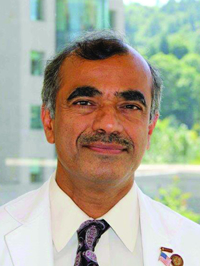Recent research has led to an increased understanding of the pathogenesis of axial spondyloarthritis, and data suggest disease progression may be preventable. This is but one exciting development in this rapidly developing area that will be explored during a Tuesday clinical symposium.

Spondyloarthropathies: Advances in the Science and Management will take place from 8:30 – 10:00 am on Tuesday in Ballroom C. The symposium will begin with a presentation by Dirk Elewaut, MD, PhD, Professor of Rheumatology and Immunology and Chair of the Department of Rheumatology at Ghent University Hospital, Belgium.
Dr. Elewaut will discuss the role of the interleukin 23/interleukin 17 (IL23/IL17) axis in the pathogenesis of axial spondyloarthritis. He will also review the evidence for the efficacy and safety of IL23/IL17 axis modulation in the management of axial spondyloarthritis.
“The primary purpose of my lecture is to highlight the importance of gut inflammation in spondyloarthritis,” Dr. Elewaut said. “So called ‘microscopic gut inflammation’ seems to be very important in determining the disease severity and outcome as it represents an important risk factor for development of Crohn’s disease as well as for evolution to ankylosing spondylitis.”
He will discuss several new advances in the field, including the link with therapy response, a non-invasive screening strategy to detect microscopic gut inflammation, along with recent data on dysbiosis and spondyloarthritis disease activity.
“New therapies are emerging in the field of both spondyloarthritis and inflammatory bowel diseases with potentially differential impact on gut and joint disease. A better understanding of the role of gut inflammation in spondyloarthritis is therefore important for clinicians,” said Dr. Elewaut, who recently became a principal investigator at the Inflammation Research Institute of the Flanders Institute of Biotechnology.

Also during the symposium, Atul A. Deodhar, MD, FACP, Professor of Medicine and Medical Director of Rheumatology Clinics at Oregon Health & Science University, Portland, will provide a more detailed look at some of the emerging therapies reference by Dr. Elewaut.
“While my talk is largely clinical, I will describe the emerging data on novel therapeutics in the treatment of ankylosing spondylitis and non-radiographic spondyloarthritis,” he said. “Within rheumatology, the field of ankylosing spondylitis is very rapidly progressing, and very exciting new discoveries are being made in this sphere.”
In fact, Dr. Deodhar said, treatments are evolving so quickly that the guidelines published less than a year ago by the ACR, the Spondylitis Association of America, and and the Spondyloarthritis Research & Treatment Network already need additions. His talk will focus on treatments that have become available since the publishing of the guidelines last February.
Dr. Deodhar will discuss promising new therapies designed to block the IL23/IL17 pathway as well as some that interfere with the JAK-STAT signaling pathway. He’ll also include some background data to illustrate how particular pathways are targeted for research and how that research is then translated from bench to beside.
Michael Ward, MD, Chief of the Clinical Trials and Outcome Branch of the National Institute of Arthritis and Musculoskeletal and Skin Diseases, will review the “ACR/SAA/SPARTAN 2015 Recommendations for the Treatment of Ankylosing Spondylitis and Non-Radiographic Axial Spondyloarthritis.” He will discuss the guideline strengths, weaknesses, and gaps.
“This session will really give the audience a feel for just how rapidly this field is evolving — from pathogenesis to the recent treatment guidelines to even newer treatments,” Dr. Deodhar said. “I know there is a lot of programming on spondyloarthritis at this meeting — posters, oral presentations, and symposia. That’s a testament to how important this subject is.”
CLINICAL SCIENCE TRACK
Spondyloarthropathies: Advances in the Science and Management
8:30 – 10:00 am Tuesday • Ballroom C
